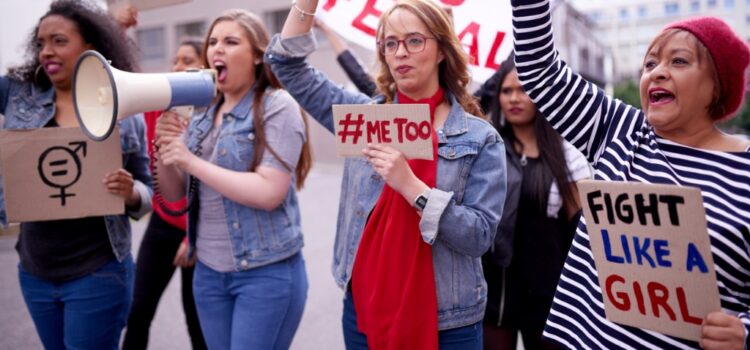
Women across the world have been celebrating International Women’s Day for more than 100 years, beginning in 1914. Every year on March 8, women remember the economic, cultural, political and social achievements of women.
This year’s theme is “Balance for Better,” with a goal to promote equality among both men and women in professional status, media perception, the positions they hold in government and more.
“Balance is not a women’s issue, it’s a business issue; the race is on for the gender-balanced boardroom, a gender-balanced government, gender-balanced media coverage, a gender-balance of employees,” according to the International Women’s Day website. “Gender balance is essential for economies and communities to thrive.”
In honor of International Women’s Day, South Kern Sol female youth reporters decided to speak about the celebration and what it means to them.
Q: Who is your female role model, and why does she inspire you?
A: There are so many women that inspire me, especially in this era of women’s empowerment. Journalists like Christians Amanpour and Rukmini Callimachi inspire me with their fearlessness and tenacity in their reporting. Callimachi occupies such a vital role in foreign policy reporting; her research is invaluable. Seeing women like Amanpour and Rukmini excell in their careers reminds me that we, as women, can and already do work that can lead to remarkable social change.
— Paige Atkison
A: My female role model is my Aunt Irene. She inspires me with her strength and independence. She does not need a man to support her. Instead, she allows a man to be a part of her life as an equal. When she wants something, she strives for it, no matter the cost or the obstacles she may face. Aunt Irene is a women in power who leads by example. Today she inspires to me to continue to work for what I want, to be rational about my decisions and stresses the importance of integrity because it reflects deeply on one’s character.
— Jessica Manzo
A: Dr. Lindsay Doe from YouTube channel Sexplanations inspires me because of her passion to teach others to be curious about their sexuality without shame and to educate people on various topics in a fun way. She inspires me today to keep learning about myself and sexual wellness, and to not be embarrassed about my own sexuality.
— Bryana Lozoya
A: I have various female role models, but specifically for photojournalism, my role model is photographer Donna Ferrato. Ferrato was the first photographer to capture domestic violence as it was occurring. Her photographs — though some quite graphic — initiated a change in how society looked at domestic violence and also lead to legal changes that solidified and identified marital rape as a crime. Her work inspires me to continue pursuing photojournalism despite the controversy we sometimes face, because it serves as proof to me that photojournalism is capable of inciting great change and makes a photograph capable of reaching deeper than just on a page.
— Lizette Chavez
A: My role model has taught me all there is to know about resilience and compassion. I admire this person for smiling even when the clouds cover her sun. No matter the situation or the place she will put others’ needs before her own. My mother inspires me to become a selfless warrior, just like her. She has taught me that you reap what you get, so always plant seeds of kindness.
— Cithlalic Martinez Diaz
Q: What are the biggest issues women still face today?
A: Women are still seen as inferior to men. It’s too often people are shocked when women take on a leadership roles or accomplish a big task. Women do not have or get the same credibility as men do.
— Jessica Manzo
A: Gender equality is still a work in progress. Women (cis and transgender) face discrimination and harassment based on their gender all over the country. In this moment, I would say one of the biggest issues women still face today is sexual assault. We, along with most cultures, have an epidemic of abuse and sexual assault of women. Changing the way we approach these issues will take time but is incredibly important.
— Paige Atkison
A: Although in recent times women have achieved many milestones and accomplishments that have launched us forward, I still feel as if we are not all on the same page regarding equality and equity. Women still struggle to be seen just a competent in the work force as a man. I hope to live to see the day where there are just as many women leading companies and enterprises as there are men.
— Cithlalic Martinez Diaz
A: I would say the biggest issue women face today is still being heard rather than listened to. What I mean is misogyny and sexism is so ingrained in both men and women. Sometimes I feel like we don’t realize it is happening until we take a step back. Or we lack the courage to speak out for fear of the repercussions. I think women need to start getting into the habit of calling out these moments as they are happening. In one of my classes, a male student made an argument, and a female student was going to make a rebuttal. As she made her point, the male student made some comments and the teacher responded to him. They were both speaking over her, something that had been made clear was not okay in this class. It wasn’t until I pointed this out what they were doing was disrespectful did any of them realize what was going on. I think that’s the biggest issue, the work it takes to dismantle a little pebble out of the wall of society just to be heard through the cracks.
— Lizette Chavez
— Bryana Lozoya
Q: What can our local community do to support gender equality?
A: I think our local community can help by being proactive about gender equality. It’s important for people to speak out and speak up for those who are discriminated against and who have difficulty being taken seriously based on their gender or sexuality. If we hold more people responsible for their words and actions, then it shows we are on a course for change in this community. There’s no room for passiveness because that’s where inequality lies.
— Bryana Lozoya
A: Listen to women. There are always qualified women who can add to the conversation, be it a panel at an event or the Congress floor. Women have valuable things to say. Other just need to listen.
— Paige Atkison
A: To support gender equality, not just in our local community but anywhere, is teach and educate youth about the women who have done great things to further gender equality. I am involved in the Philosophy for Children Program and ironically, my last session was about breaking stereotypes. We read and discussed the book of “The Paper Bag Princess,” where a princess was the hero and had to save the prince. There are so many opportunities where women are seen as weak and dependent of a man or need to be taken care of because they are so timid. We need to educate children in seeing women can even do more than a man.
— Jessica Manzo
A: I feel that our local community attempts to do a lot for gender equality, but I feel like a lot of its progress is limited or stunted by lack of communication. There are a lot of organizations and centers in Bakersfield focused on equality who host events or meetings about the topic, but often times the events are now made known. I think there needs to be a greater focus on spreading the word in order to educate our residents.
— Lizette Chavez
A: Our local community can start by abandoning such antiquated ways of viewing women. Although these stigmas of women only being mothers and housewives aren’t as prevalent anymore it is still something that needs to be taken care of before we can be see as an equal by all and not just a select few.
— Cithlalic Martinez Diaz
Q: What does being a feminist mean to you?
A: Being a feminist for me is being all inclusive to gender, race, sexual orientation and class. I feel if there are any discrepancies in support for all these ways to identify and you are ostracizing people, then you are not a feminist, nor do you have an idea of what feminism is actually supposed to be. Feminism is equality across the board — not just for some things. It is not just female inclusive — the word is phonetically (fem-men-ism), female, men, organism. Femenism is all inclusive, it’s men and women as equal living organisms, whether they identify as a man or woman or neither, gay, straight, black or white, poor or wealthy, young or old.
— Lizette Chavez
— Paige Atkison
A: Being a feminist for me personally is not having these preconceived notions of what a woman is supposed to be. It means to treat and respect a women in all circumstances, not having this division between the two genders. It is knowing and wanting to seek change so women are acknowledged and seen as a person rather than seen just as a girl.
— Jessica Manzo
A: To me, a feminist means sticking up for anyone who is being discriminated against, now matter how that person identifies. Any and every kind of discrimination is wrong. Also, being a feminist to me is recognizing other’s pain and the kind of inequality or discrimination they go through. I think more people need the mindset of advocating for each other, or just remembering that they can advocate for others while advocating for their specific cause as well. There is strength in numbers and team work.
— Bryana Lozoya
A: To me being a feminist means speaking up about the injustices you feel are hurting the success and progression of women. Feminism is a way of using your voice to make a change and target those who can relieve these hardships. It means being a warrior or what you care about and pursuing a better future.
— Cithlalic Martinez Diaz


